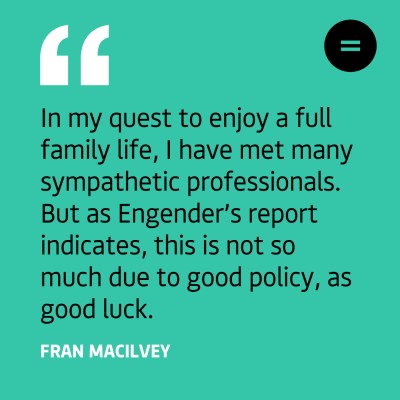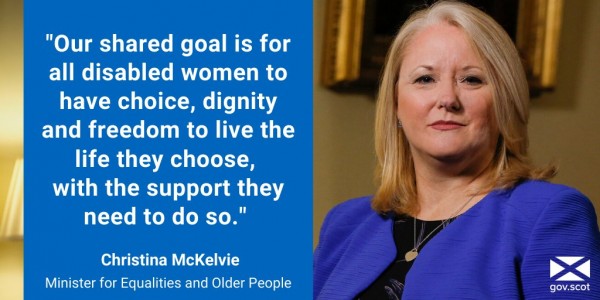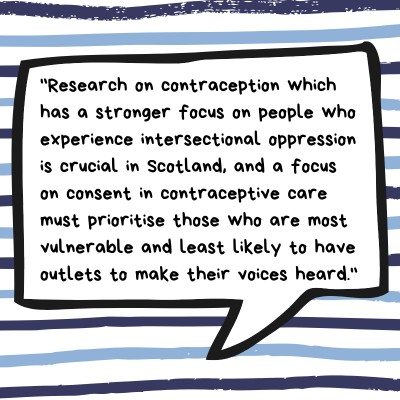Engender blog
Trapped: the call for a more flexible world
Fran Macilvey is an Edinburgh-based author. Her memoir ‘Trapped’ tells the story of her life with cerebral palsy. She has also published two self-help books which she thinks of as ‘gleaning something valuable from forty years of making mistakes’ and has recently finished writing three novels about women’s experiences with the law.

As part of a series of events being organised by Edinburgh Libraries to mark International Women’s Day on 8th March 2022, I was asked to take part in a panel discussion. Our brief, to publicise the life and work of an Edinburgh-based woman (or group of women, why not?) brought me to Engender, who invited me to contribute a guest post to ‘On the Engender’. I’m delighted and honoured to have this opportunity.
Reading Engender’s 2018 report, Our Bodies, Our Rights has been a vindicating – and at times, depressing – experience. It is a brave and realistic assessment (at last!) of the gaps in health and social provision that hinder disabled women in exercising their private and reproductive choices; in effect, their most basic human rights. Whether to have intimate relationships – read that again – whether to get married and have children, and how to bring them into adulthood while running the gamut of inconsistent and unpredictable help from professionally-minded others with rather mixed agendas. Thorny personal decisions which, as often as not, we have to navigate alone, in the face of fairly generalised ignorance and many misplaced good intentions. But this is only one aspect of the price that I, and countless others, continue to pay in our efforts to participate in mainstream life.
GUEST POST: Sex, Relationships and Parenthood – A Network Supporting Young Women and Girls with a Learning Disability
In this guest blog, Yvonne Kerr, Programme Manager in Sexual Health and Blood Born Viruses at NHS Lothian, discusses the national Relationships, Sexual Health and Parenthood and Learning Disability / Additional Support Needs Network.
Engender’s report, Our Bodies Our Rights, found that a lack of knowledge and access to information acts as a barrier to disabled women’s reproductive rights because of a huge knowledge gap regarding disabled women’s reproductive, sexual and maternal health. It also found that access to inclusive and targeted sex and relationships education for disabled young women and girls is also almost entirely absent from mainstream and specialist education.
![Graphic shows a light pink back ground with dark purple text that reads, "It became apparent early on in the life of the group that young people with additional support needs and/or learning disabilities were a group much more likely to miss out on this [RSHP] education, and that this was particularly the case for young people who had severe and complex additional support needs." The quote is attributed to Yvonne Kerr, Programme Manager in Sexual Health, NHS LOTHIAN. The Engender logo is bright pink circle with an equals sign at the centre of it, in the right hand corner of the graphic.](/siteimages/Blog/resized/yvonne-kerr-guest-blog-quotes-square-1080x1080-400.png)
We therefore recommended that “Scottish Government, Education Scotland and local authorities should work together to create a national network of RHSP workers specialising in disability who can share good practice across Scotland”. We are very pleased to be members and to work with Yvonne and others to help organise the secretariat for the Network to advocate for girls and young women’s rights in RSHP education. We asked Yvonne to write a blog about her work in this area.
--
Our Bodies Our Rights in Lockdown
In this blog, Engender's Policy and Parliamentary Manager Eilidh Dickson, discusses the Our Bodies Our Rights report, the impact of the Covid-19 pandemic on disabled women, and our new survey developed with People First Scotland.
-400.png)
This month represents an anniversary nobody could have previously imagined as we mark a year since the first Covid-19 cases in Scotland and the transition into the first national lockdown on the 23rd March 2020. Even in those early weeks, Engender highlighted how Covid-19 and the public health measures necessary to save lives would impact on women, from access to decision-making to mental health of unpaid carers and frontline workers in health and social care and to increased childcare and home-schooling making it even harder for women to combine paid and reproductive work.
Women have shared their diverse but often deeply distressing stories with us through our Women Covid Scot page, all too often describing the risks of working on the frontlines; fear of careers disrupted or derailed and the toll of balancing paid work, mounting domestic work and home-schooling with limited support from employers or partners, cut off from their external support networks. UN Women has estimated that the pandemic could set back global progress on women’s rights back by 25 years.
In March 2020 Engender was also preparing to host an event at the Scottish Parliament reflecting on a year since the launch of our Our Bodies Our Rights Report which examined the barriers to disabled women's reproductive rights in Scotland. This project saw us speak with disabled women across Scotland to hear about their experiences of puberty, sex education, relationships, family planning, maternity services, parenting support and the menopause. Policy and practice across healthcare, education, justice and social care, among many other public services, was found to ignore disabled women’s needs.
Our Bodies Our Rights - speech from Christina McKelvie MSP
Today Engender was planning on hosting a Parliamentary reception to mark the anniversary of our report Our Bodies Our Rights: Identifying and removing barriers to disabled women's reproductive rights in Scotland. Given the developing situation around COVID 19 (also known as Coronavirus), and as the needs of disabled women and carers are at the heart of our work on Our Bodies Our Rights, we took the the difficult decision to cancel this event.
While we were incredibly disappointed not to be able to hold the event as planned, we're pleased to be able to share the speech which would have been given by Christina McKelvie, Minister for Equalities and Older People.

I am truly delighted to be here to hear and discuss the progress made since the launch of this incredibly enlightening and important report published just over a year ago.
We’re just past International Women's Day, a day to celebrate the social, economic, cultural and political achievements of women. The theme for this year is #EachforEqual, recognising the ways in which individual actions can challenge stereotypes and fight bias to collectively enable wider change as we build a more gender equal world. Seems apt!
Since the publication of Our Bodies, Our Rights, the Scottish Government has taken steps and made commitments which I hope you will be pleased to hear about tonight, and which I suspect some of your in this room were involved in making come about!
Guest Post: Exploring contraception as a feminist issue

As discussions around schemes which offer women support on the condition they utilise long-acting reversible contraceptives (LARC) continue, we've hosted a series of blogs by Elspeth Wilson discussing her research into how LARC has historically been - and continues to be - used to control the fertility of marginalised people. Read Elspeth's previous blogs here.
In her final blog, Elspeth explores adequate and accessible contraceptive care as a feminist issue.
The Pause programme highlights that accessible contraception is only one part of the fight for adequate contraceptive care. Conversations on contraception frequently focus on access and whether and how people can get the kind of contraception they want to use. Obviously, this an important concern but it is only one side of the conversation. I hope that in my discussion of consent and information in the other blogs in this series I have been able to show that the question of who gets offered what contraception and why must also be central to feminist discussions of contraceptive care. If we are to approach contraception as an intersectional feminist issue the question of whose fertility is (de)valued and whose is seen as something to be controlled is imperative.
Downloads
 Engender Briefing: Pension Credit Entitlement Changes
From 15 May 2019, new changes will be introduced which will require couples where one partner has reached state pension age and one has not (‘mixed age couples’) to claim universal credit (UC) instead of Pension Credit.
Engender Briefing: Pension Credit Entitlement Changes
From 15 May 2019, new changes will be introduced which will require couples where one partner has reached state pension age and one has not (‘mixed age couples’) to claim universal credit (UC) instead of Pension Credit.
 Engender Parliamentary Briefing: Condemnation of Misogyny, Racism, Harassment and Sexism
Engender welcomes this Scottish Parliament Debate on Condemnation of Misogyny, Racism, Harassment and Sexism and the opportunity to raise awareness of the ways in which women in Scotland’s inequality contributes to gender-based violence.
Engender Parliamentary Briefing: Condemnation of Misogyny, Racism, Harassment and Sexism
Engender welcomes this Scottish Parliament Debate on Condemnation of Misogyny, Racism, Harassment and Sexism and the opportunity to raise awareness of the ways in which women in Scotland’s inequality contributes to gender-based violence.
 Gender Matters in Social Security: Individual Payments of Universal Credit
A paper calling on the Scottish Government to automatically split payments of Universal Credit between couples, once this power is devolved to the Scottish Parliament.
Gender Matters in Social Security: Individual Payments of Universal Credit
A paper calling on the Scottish Government to automatically split payments of Universal Credit between couples, once this power is devolved to the Scottish Parliament.
 Gender Matters Manifesto: Twenty for 2016
This manifesto sets out measures that, with political will, can be taken over the next parliamentary term in pursuit of these goals.
Gender Matters Manifesto: Twenty for 2016
This manifesto sets out measures that, with political will, can be taken over the next parliamentary term in pursuit of these goals.
 Scottish NGO Briefing for UN Special Rapporteur on Violence Against Women
Joint briefing paper for the UN Rapporteur on Violence Against Women.
Scottish NGO Briefing for UN Special Rapporteur on Violence Against Women
Joint briefing paper for the UN Rapporteur on Violence Against Women.

Newsletter
Sign up to receive our newsletter here:
Sign up to our mailing list
Receive key feminist updates direct to your inbox: